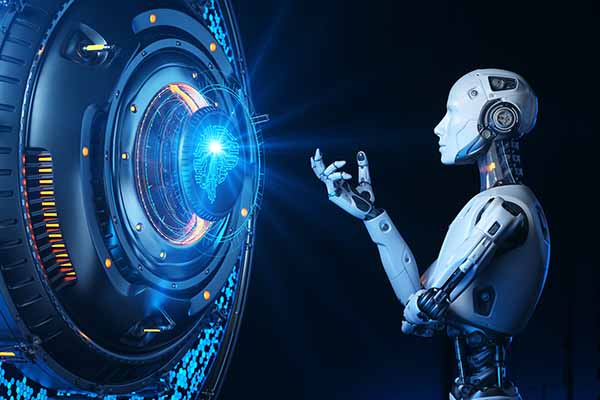How Will Artificial Intelligence Change the Way We Live and Work?
Artificial Intelligence (AI) is no longer just a concept in science fiction; it is a transformative force reshaping every aspect of our lives, from how we work to how we interact with the world around us. AI technologies are evolving at an unprecedented rate, and they hold the potential to revolutionize industries, create new opportunities, and fundamentally change the way we live and work.
In this article, we will explore how AI will influence our daily lives, the workplace, and society as a whole in the coming years.
1. AI in Daily Life: Smart Living and Convenience
AI is already making significant strides in improving our everyday lives. From voice-activated assistants like Amazon’s Alexa and Apple’s Siri to personalized recommendations on Netflix and Spotify, AI has become an integral part of modern life. As AI technology continues to evolve, its applications in daily living will expand, creating more intelligent, efficient, and personalized experiences for individuals.
- Smart Homes: AI will make homes smarter by managing everything from lighting and heating to security and entertainment systems. AI-powered devices will learn user preferences and adjust accordingly, optimizing energy use and improving comfort.
- Healthcare Advancements: AI has the potential to revolutionize healthcare by assisting in early diagnosis, personalized treatments, and patient management. AI algorithms can analyze medical data to detect diseases earlier, recommend treatment options, and help doctors make more accurate decisions.
- Autonomous Vehicles: Self-driving cars, trucks, and drones powered by AI will reshape the way we travel and transport goods. Autonomous vehicles have the potential to reduce traffic accidents, improve road safety, and make transportation more efficient.
- Personal Assistants: AI-driven virtual assistants will continue to improve, enabling individuals to manage tasks such as scheduling, shopping, and communication with greater ease and efficiency.
2. AI and the Workplace: Automation and New Job Opportunities
One of the most profound impacts of AI will be felt in the workplace. AI is poised to automate many routine and repetitive tasks, freeing up human workers to focus on more creative, strategic, and high-value activities. However, this shift also brings about challenges, such as job displacement and the need for workers to acquire new skills.
- Automation of Repetitive Tasks: AI-powered robots and software systems can handle repetitive tasks such as data entry, customer service inquiries, and inventory management. In sectors like manufacturing, AI-driven automation will increase productivity while reducing human error and operational costs.
- Collaboration with AI: Rather than replacing human workers entirely, AI is more likely to complement human capabilities. Workers in fields such as healthcare, education, and customer service will collaborate with AI systems to enhance their productivity. For example, doctors may rely on AI to analyze medical images, while teachers may use AI to create personalized learning plans for students.
- Creation of New Job Roles: As AI continues to advance, new job roles will emerge in fields such as AI development, data analysis, and robotics maintenance. Workers will need to acquire new skills to keep up with the evolving job market. The demand for workers with expertise in AI and machine learning will grow, leading to the creation of training programs and educational opportunities.
- Remote Work and Flexibility: AI-driven tools will make remote work more efficient and seamless. Virtual collaboration platforms, powered by AI, will help teams communicate and collaborate more effectively, regardless of location. AI will also assist in scheduling meetings, managing tasks, and enhancing productivity in remote work environments.
3. AI in Business: Improved Decision-Making and Innovation
AI is transforming the way businesses operate, helping companies streamline operations, improve customer experiences, and make more informed decisions. The adoption of AI technologies will drive innovation and create new business models, giving companies a competitive edge in the marketplace.
- Data-Driven Decision Making: AI’s ability to analyze vast amounts of data will enable businesses to make more accurate, data-driven decisions. AI can identify patterns and trends that might otherwise go unnoticed, helping companies optimize their strategies and improve efficiency.
- Personalized Customer Experiences: AI-powered systems can analyze customer data to deliver personalized experiences, from targeted marketing campaigns to customized product recommendations. This level of personalization can enhance customer satisfaction and loyalty, ultimately driving sales and growth.
- Supply Chain Optimization: AI can help businesses optimize their supply chains by predicting demand, managing inventory, and improving logistics. This can result in cost savings, reduced waste, and improved delivery times.
- AI and Innovation: AI will enable businesses to innovate by automating research and development processes, simulating product designs, and analyzing market trends. This can lead to faster product development cycles and the creation of new, groundbreaking products and services.
4. AI and Society: Ethical Challenges and Social Impacts
As AI becomes more ingrained in our lives, it raises important ethical and societal questions. The development and deployment of AI technologies must be approached with caution to ensure that they are used responsibly and for the benefit of society as a whole.
- Privacy Concerns: AI systems often rely on large amounts of personal data to function effectively. As AI-powered devices and services become more prevalent, ensuring the privacy and security of personal data will be a top priority. Governments and organizations will need to establish regulations and safeguards to protect individuals’ privacy.
- Job Displacement and Inequality: While AI will create new job opportunities, it will also lead to the displacement of certain jobs, particularly in industries where automation can replace human labor. This may exacerbate income inequality and create challenges for workers who lack the skills to transition to new roles. Governments and businesses will need to invest in retraining and reskilling programs to help workers adapt to the changing job market.
- Bias and Fairness: AI systems can perpetuate biases present in the data they are trained on. If not properly managed, this can lead to discrimination in areas such as hiring, lending, and law enforcement. Ensuring that AI systems are fair and unbiased will require ongoing monitoring and regulation.
- Ethical AI Development: As AI becomes more autonomous, ethical concerns about decision-making processes will arise. For instance, how should an AI system prioritize the safety of individuals in an autonomous vehicle accident? Ethical frameworks will need to be developed to guide AI development and ensure that these technologies align with human values.
5. The Future of AI: Potential and Possibilities
Looking to the future, the potential for AI is vast. As technology continues to advance, we can expect even more profound changes in the way we live and work. Some of the most exciting possibilities include:
- AI in Space Exploration: AI will play a crucial role in space exploration, from autonomous spacecraft navigation to analyzing data from distant planets and moons. AI-powered robots could assist astronauts in performing tasks on space missions, reducing the risks involved and increasing mission efficiency.
- AI and Environmental Sustainability: AI can help address global environmental challenges by optimizing energy use, reducing waste, and developing sustainable solutions. AI-powered systems can monitor environmental conditions, predict natural disasters, and assist in managing renewable energy resources.
- The Rise of General AI: While current AI systems are designed for specific tasks, the development of Artificial General Intelligence (AGI) – machines with the ability to perform any intellectual task that humans can do – could have far-reaching implications. AGI could revolutionize industries, accelerate scientific discoveries, and enhance human capabilities in ways that were previously unimaginable.
Conclusion
AI is set to profoundly transform the way we live and work. From enhancing daily convenience to reshaping entire industries, the impact of AI will be felt across every sector of society. While AI brings immense potential for innovation and progress, it also raises important ethical and social challenges that must be carefully managed.
To fully harness the benefits of AI, it is crucial for governments, businesses, and individuals to embrace new technologies while addressing the challenges that come with them. By doing so, we can ensure that AI contributes to a more prosperous, efficient, and equitable future.

